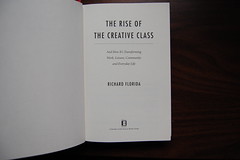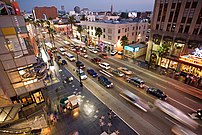A short article from The Baptist Standard raises the tension between Creative Class lifestyles and the future of the local church.
I became fascinated with the Creative Class since finding Richard Florida's book on a Borders Bookstore shelf in 2002. I quickly read it, incorporated some of the ideas into my first book on Mosaic, and expanded the ideas in my next book and a forthcoming journal article that will eventually be available in the journal Sociology of Religion. I think the emerging Creative Class is important for the future of American religion.
In any case, it seems like it always takes a while for ideas to get filtered more broadly. And the notion of the Creative Class is just beginning to get more attention among church leaders.
The Creative Class represents a different kind of economics and lifestyle. Episodic work, more creatively-intellectually intensive efforts, greater openness to diversity and multiculturalism are only some of the characteristics Florida suggests are central to this new social group. Cities have followed Florida's advice for revitalizing their urban environments in order to attract more of these "creative types" since Florida forcefully argues (and many city leaders agree) that economically thriving cities actively attract and engage the Creative Class.
Now that cities are paying attention, churches are trying to shift as well. This little article from The Baptist Standard gives a glimpse at how conservative churches are altering their ministries to accommodate what they see as a surge of the local population (gentrification, anyone?) and still want to be "church" for them. From blighted to revitalized, these churches want to be part of the upswing in local happenings.
And when you consider how many congregations had initially been built in city-centres (and then promptly lost their memberships as automobiles and suburbs moved church-going populations outward), they really want to find ways to redefine their ministries to reach these new urbanites.
What may have seemed like "crazy ministry philosophies" for people in L.A. doesn't seem so crazy now.
I became fascinated with the Creative Class since finding Richard Florida's book on a Borders Bookstore shelf in 2002. I quickly read it, incorporated some of the ideas into my first book on Mosaic, and expanded the ideas in my next book and a forthcoming journal article that will eventually be available in the journal Sociology of Religion. I think the emerging Creative Class is important for the future of American religion.
 Image by marklarson via Flickr
Image by marklarson via Flickr
In any case, it seems like it always takes a while for ideas to get filtered more broadly. And the notion of the Creative Class is just beginning to get more attention among church leaders.
The Creative Class represents a different kind of economics and lifestyle. Episodic work, more creatively-intellectually intensive efforts, greater openness to diversity and multiculturalism are only some of the characteristics Florida suggests are central to this new social group. Cities have followed Florida's advice for revitalizing their urban environments in order to attract more of these "creative types" since Florida forcefully argues (and many city leaders agree) that economically thriving cities actively attract and engage the Creative Class.
 Image via Wikipedia
Image via Wikipedia
Now that cities are paying attention, churches are trying to shift as well. This little article from The Baptist Standard gives a glimpse at how conservative churches are altering their ministries to accommodate what they see as a surge of the local population (gentrification, anyone?) and still want to be "church" for them. From blighted to revitalized, these churches want to be part of the upswing in local happenings.
And when you consider how many congregations had initially been built in city-centres (and then promptly lost their memberships as automobiles and suburbs moved church-going populations outward), they really want to find ways to redefine their ministries to reach these new urbanites.
 Image by 1546 via Flickr
Image by 1546 via Flickr
What may have seemed like "crazy ministry philosophies" for people in L.A. doesn't seem so crazy now.




1 comment:
Greetings from Trinity Evangelical Divinity School, Chicago. I'm working on a paper evaluating the impact and implications of the creative class phenomenon for the Church, and ran across your blog. I'm getting your book in a few minutes, but I wondered if you could point me to any other good sources reflecting on this subject. Thanks also for the link to the Baptist Standard article.
Regards,
Matt Stephens
Post a Comment